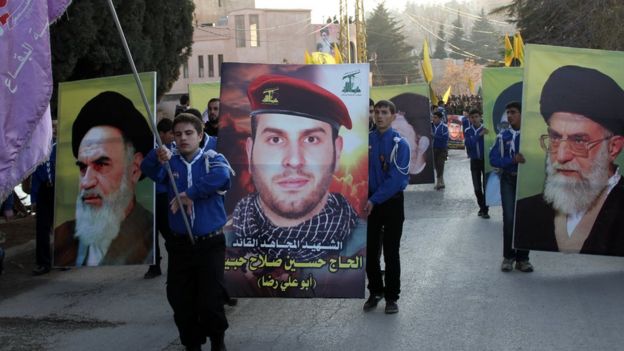 AFP, Syria’s Alawites are closely associated with Bashar al-Assad (R) and his late father Hafez (L)
AFP, Syria’s Alawites are closely associated with Bashar al-Assad (R) and his late father Hafez (L)
‘Muslim quality’
In part from BBC: The Alawites emerged in the 10th Century in neighbouring Iraq.
Little has been confirmed about their beliefs and practices since then because, according to the leaders, they had to be hidden to avoid persecution.
However, most sources say the name “Alawite” refers to their veneration of the first Shia imam, Ali, the son-in-law and cousin of the Prophet Muhammad.
 AFP: Shia power Iran and Lebanon’s Shia Hezbollah movement are assisting the Assad regime
AFP: Shia power Iran and Lebanon’s Shia Hezbollah movement are assisting the Assad regime
For full comprehensive summary by the BBC, go here.
****
al-Arabiya: The most significant development coming from Syria in the last few days is not the killing of Al-Qaeda spokesperson in Idlib or the US-Russian chatter denying a plan to oust Bashar Al-Assad. It was a document leaked to the Western media and dubbed as the “declaration of identity reform” signaling signs of discontent from elders in the Alawite community towards the Syrian regime.
The news of the document is the most concrete evidence we have from Assad’s religious community since the beginning of the uprising in 2011, indicating that their patience is running out with the status-quo and they are openly seeking a third alternative. For such alternative to materialize, however, and for the Alawites to publicly start abandoning Assad, a political and security umbrella has to be extended from Russia and regional countries, guaranteeing their protection and role in a pluralistic future in a post-Assad Syria.

Alawite discontent
Syria’s Alawites have been both, the cornerstone for the regime’s survival and its Achilles’ heel. A 15% of Syria’s population (estimate of 3 million), the minority enjoys the lion’s share in the regime political and security hierarchy. Assad, the Chief of Staff of the Syrian Army, heads of the intelligence services are all from the powerful sect. When the state security proved not enough, a new militia was formed and allied with the regime and Iran to protect the Alawites along the coastline and in the mountain region over Latakia.
“The declaration from the Alawite leaders is a watershed moment in how the minority is publicly untying itself from Assad family, and attempting to pursue a pact of coexistence in Syria”, Joyce Karam.
The new declaration as leaked by European media, exposes fissures between the Alawites and the regime, and efforts to pursue a third option, instead of prolonging Assad’s military campaign, or getting overridden by extremist groups. According to the The Telegraph, the document authors “had been forced to act because of the extreme danger the sect was now facing” amid reports of enormous losses for the Alawites (a third of their young) in the 5-year-long war. In a political departure from the regime narrative, the declaration speaks of “a new relationship with Syria’s Sunni majority” while calling the regime as “totalitarian”, and the uprising “an initiative of noble anger”. The document also promotes a vision for secular, pluralist and democratic state of Syria.
By distancing themselves from the regime, the Alawite signatories are seeking a path that is not hostage to Assad’s strategy of war and outright military victories that could take years or lead to disintegration of Syria. From the beginning of the conflict, there were shy attempts from the Alawite community showing discontent with the Assad family and the war realities. In the last year the community has demonstrated in Latakia calling to execute Assad’s cousin, Suleiman, now serving a 20-year sentence in prison. In 2014, protests from members of the community broke out in Tartous and in Homs over the bombing of elementary schools and the failure of the security to protect their children.
Assurances from Region and Russia
The declaration from the Alawite leaders is a watershed moment in how the minority is publicly untying itself from Assad family, and attempting to pursue a pact of coexistence in Syria. However, and unless it’s met by political and security assurances from the West, the region and Russia, this momentum will not hold against a status quo of fear from extremism that forces Alawites to be more dependent on Assad and local militias.
For a minority whose roots are entrenched in the Levant and has survived the Mamluks, the Crusaders, and the Ottomans, it is only natural that its fate won’t be parallel and decided by the Assad family. It is the regime and not the family that holds higher priority for the Alawites, and even then, negotiating a new pact of governance is the most pragmatic and secure approach for the community’s future in Syria. The heavy toll of the war and the strong presence of Al-Qaeda’s Jabhat Nusra in Northern of the country are ominous signs of what could yet come if no political solution is achieved.
In that context, Russia’s intervention and establishing a presence in Khmeimim airbase in Latakia could make Moscow a key guarantor for the Alawites in a post-Assad Syria. Regional countries such as Saudi Arabia who helped assure the Lebanese Christians at the end of the civil war by brokering the Taif agreement, or Turkey who holds influence in Northern Syria could help in mediating between the Alawites and the opposition.
There is already plenty of buzz regionally of backchannel diplomacy to resolve the Syrian conflict, supervised by John Kerry and Sergei Lavrov, before U.S. President Barack Obama leaves office. There are also questions on recent reports of relieving Maher al-Assad of his duties in the Republican Guard, and what that could mean for the negotiations, for the Alawites and Moscow’s role.
The Alawite declaration this week from Syria, is a critical opportunity to start a conversation about the status of the minority in a post-Assad structure. Absent of guarantees in form of protection and political assurances, this paper will be shelved along a thick bundle of documents and goodwill gestures to resolve the conflict.
 USAToday
USAToday
*****
WSJ: GENEVA—Talks aimed at ending the five-year war in Syria ground to a halt with the government and opposition divided over fundamental issues, including whether President Bashar al-Assad’s political fate even belongs on the agenda.
The regime insists that Mr. Assad remain in power, and the opposition demands that he step down. With an August United Nations deadline looming to form a new government and the peace process floundering, participants in the talks have floated alternatives aimed at breaking the deadlock that appease some parties but anger others.
Among the ideas are to transfer Mr. Assad’s powers to a handful of deputies; to form a new ruling council comprised of Syrian military officials and moderate rebel leaders; and to coalesce around a new Syrian leader who feuding camps could support.
None of the alternatives has gained traction, and each would face serious, possibly insurmountable, obstacles even if they garnered support in the Geneva talks. The discussions around them are a sign of the lengths to which negotiators are going in an effort to maintain some form of dialogue.
“Geneva is a process without content,” a senior Western diplomat said. Much more here.
AFP, Syria’s Alawites are closely associated with Bashar al-Assad (R) and his late father Hafez (L)
AFP: Shia power Iran and Lebanon’s Shia Hezbollah movement are assisting the Assad regime
